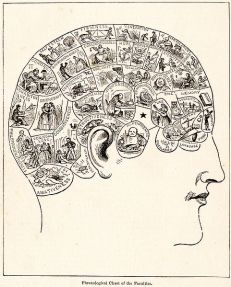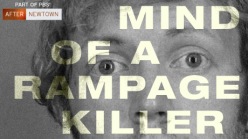I’ve been home sick, and rather than watch the entire Downton Abbey Series, I fell into the world of Investigation Discovery (ID) Canada. This true crime drama channel, which has shows on crime, police, missing persons, and revenge. I prefer watching some of those shows to the crime dramas like CSI (any version) because the crimes are true, and some of them truly are stranger than fiction.
One show in particular always catches my attention: Born to Kill?
As they recount the journey of many killers, from the DC sniper to Jeffrey Dahmer, the criminologists and psychologists generally state that these killers were born to it. Their hypotheses are usually based on how the person was raised, the coincidental meetings that culminate into a deadly encounter, and the lack of empathy that these people inevitably show. Essentially, its their way of explaining these killers to the public, to placate them that this wouldn’t happen to just any body.
But, what actual evidence to we have that people are in fact Born to Kill? And, is this just another nature vs nurture debate?
Enter the PBS show Nova. This Wednesday (February 20, 2013 at 9pm EST) the episode titled Mind of a Rampage Killer, a series looking at the effects of the Newtown shootings. The preview suggests that in brain scans that scientists can actually tell the physicial differences in a killer’s brain. They even point to MRIs showing brain function and the connections between them. I know the entire series isn’t based on this, but it reminded me of the science of phrenology and pshysiognomony.
According to Wikipedia, phrenology is:
is a pseudoscience primarily focused on measurements of the human skull, based on the concept that the brain is the organ of the mind, and that certain brain areas have localized, specific functions or modules.[1] The distinguishing feature of phrenology is the idea that the sizes of brain areas were meaningful and could be inferred by examining the skull of an individual. Following the materialist notions of mental functions originating in the brain, phrenologists believed that human conduct could best be understood in neurological rather than philosophical or religious terms. Developed by German physician Franz Joseph Gall in 1796,[2] the discipline was very popular in the 19th century, especially from about 1810 until 1840.

Phrenology diagram. From People’s Cyclopedia of Universal Knowledge (1883).
This is a file from the Wikimedia Commons. This media file is in the public domain in the United States. This applies to U.S. works where the copyright has expired, often because its first publication occurred prior to January 1, 1923.
What I find interesting about the brain map provided by the Wikipedia Entry, is how similar it is to current maps of our brain, where we see which lobes produce what actions, our thoughts, our compulsions, our desires etc.
MRIs are mapping our brain in new ways, and we are searching the patterns to determine if we have schizophrenia, if obsessions and compulsions can be measured, and even if we can see what the other person sees in real-time. But we are essentially trying to answer the same questions, over and over again.
What drives people to do what they do? Is it because they’ve ‘snapped’ or are they actually born to kill?
What I find really fascinating, is that while they may be able to discern connections between the brain, the way it works and our behaviour, science has already proven that our brains are malleable. Documentaries indicate that Post-Traumatic Stress Disorder, and even Schizophrenia can be changed (and improved) within a brain. I’ve even seen a TV episode of Curiosity (on our Canadian Discovery Channel) where a hypnotist hypnotized a man into killing someone. The man thought it was true, even though the death and bullets were fake. (Incidentally, I really think they should follow-up with that person, given that he really thought he killed someone).
If our brains are so malleable, can we identify people born to kill? Or is the scan simply a snapshot of the way the brain is currently wired?
And, if brain scans can realistically identify killers before they kill, would regular scans be a part of our yearly physical?
Since I’m not an expert in this field, but simply fascinated by it, I’d love your thoughts on this topic.
Will you watch the show?
Have you had a brain scan? What was your experience?
Do you think people are born to kill? Do you think we can even tell if people are? Do you think science is getting closer to determining it?
*****
Connect with me on Twitter, Facebook, and LinkedIn. Plus, sign up for free e-mail updates from this blog in the top right-hand corner of the page.

This is fascinating question, Heather. I agree it’s the same nature vs. nurture discussion we’ve been having for years. Another question is, IF we could determine that a child is “born to kill,” what would we do about it? Institutionalize him for life? Would there be a way to change his genetic predisposition through some sort of treatment? A thought-provoking post!
LikeLike
I agree Gerry. Even if we could find a link would we know enough to treat them? Would it even be possible to treat them? I know in schools they find kids with sociopathic tendencies, and schools really try to identify them early so they can go through treatment long before they hit puberty, but even then, how effective are those treatments, and how often does it occur? I would love to see some studies on this. But I think given how malleable our brains are that we should (at least theoretically) be able to treat them.
LikeLike
I’ve no idea Heather, but tell you what, the series The Following is completely freaking me out! I suspect that some people reason things out in their mind to a way where it makes that action possible and some people don’t understand right from wrong in a socially acceptable way, but I do know that the media propagates an us/them mentality, as in “they’re not one of us to be able to do THAT”, and this way segregates (usually) racial stereotypes, unless the perpetrator is the same race as the “us” and then the segregation becomes a mental/normal one. This is fed to babies by Disney and all the way up to old age by any media you look at/listen to. I suspect that a lot of perpetrators can excuse their action based on media related messages. (Ok, getting off my CMNS scholar soap box now) I hope you feel better soon. It’s that miserable time of year, isn’t it?
LikeLike
Yes, watching the Investigation Discovery Channel TV show experts definitely shows evidence of “They’re not like us.” In many cases I think it’s to appease people, so they won’t be afraid that just anybody can be affected by this. So perhaps if we cannot segregate people by race or by gender any more, maybe they will try to segregate people based on brain type?
LikeLike
i would love if a brain scan could warn you, but more importantly, we need an avenue for those we think are likely. as a teacher, i know which students are “off” by the time they get to me. unfortunately, we don’t have a place to send them to get help or an avenue to seek for help within our building with these students. i’m guessing in most cases their teachers knew, but what do we do? it isn’t enough to just be nice to these kids. this is a huge subject with me. i keep saying to anybody that will listen that we need medical/psychological help in schools for these types of students. it’s very frustrating from our side. we want to help save these kids, but we need the proper support for them.
LikeLike
I totally agree with you Bolton. After the PBS Nova show last night (which I did watch) they had a second one about the “safe schools initiative” which I thought was even more informative because it went through several schools where there were threats.
But teachers aren’t necessarily trained to know what’s wrong with students. Often they can only bring them to their area’s psychologist, which they meet with infrequently, and it takes far too long for a diagnosis that way. Do you think that having a more qualified person in each school would help get these kids the help they need?
LikeLike
actually, we can diagnose there’s a problem. but we have nowhere to get them help. they need immediate help and intensive help and there’s nowhere to go with them. that’s what we need.
LikeLike
People can certainly be born with greater of lesser inclinations to aggression (and perhaps violence). Whether they become killers is a question of tools, incentives, opportunity, genetic factors that may hold them back (such as an equal tendency to anxiety), etc. I fear people armed with junk science and pseudoscience who make try label certain folks as “hopeless cases” — and even pre-emptively single them out for imprisonment “for the greater good.”
LikeLike
I agree. Just because someone may show signs that they are inclined to violence doesn’t mean that they will show violence and can’t be helped if they are. Preemptively scanning for such tendencies could lead to more trouble for people who aren’t dangerous.
LikeLike